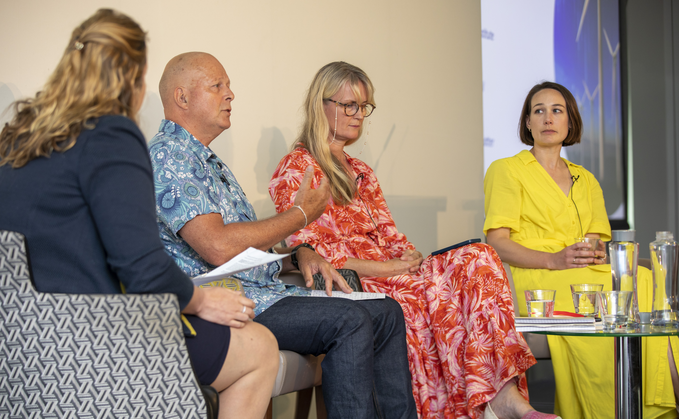
(left to right) Katrina Lloyd, editor-in-chief of Investment Week; Tony Burdon, CEO of Make My Money Matter, Amy Clarke, co-founder and chief impact officer at Tribe Impact Capital; and Bella Landymore, joint interim CEO of Impact Investing Institute
The adage of sacrificing returns for the sake of ‘doing good’ with investments is a “convenient excuse” for advisers to avoid engaging their clients with sustainable investing effectively, according to speakers at this week's Sustainable Investment Festival.
In the third year of the annual event, Katrina Lloyd, the editor-in-chief of Professional Pensions' sister title Investment Week, hosted the opening panel, entitled ‘CEOs in conversation: Engage, lead, change'.
Discussing the best way forward for investors, regulators and companies to work together to improve the impact they have on the environment and society, Tribe Impact Capital co-founder and chief impact officer Amy Clarke was asked about the "legitimate concerns around putting clients in a product that is doing what it says it is" and in particular "this issue around performance".
Sustainable and ESG-focused funds have taken a hit to performance over the past 12 months, as the more growth-biased sectors favoured by the trend, such as technology, have been affected by rising inflation and interest rates. At the same time, sectors typically excluded from sustainable funds, such as oil and gas, have rallied amid last year's energy crisis.
This has resulted sharp outflows from ESG equity funds, with Calastone's latest Fund Flow index reporting the worst ever outflows for this type of portfolio last month.
This was only the second month in five years where the sector experienced any net outflows, the data showed.
Clarke said: "Performance can be a little bit of a red herring, because it goes into the short-termism that is embedded in the current code that we have in finance."
She added: "Warren Buffett said ‘if you are not willing to hold a stock for ten years, then do not hold it for ten minutes'.
"We have got to start thinking about the long-termism and what constitutes a good investment in what is a fundamentally changed world."
Make My Money Matter chief executive Tony Burdon echoed the investment opportunity that presents itself within sustainable investing, especially for pension funds.
Quoting former governor of the Bank of England Mark Carney, he said: "This transition that we are going to see across our societies and our industries provides the biggest commercial opportunity since the Industrial Revolution. So there is great opportunity out there, financial opportunity."
Clarke said the underperformance narrative happening at the moment "can be used as a as a convenient excuse for not leaning into this type of investment".
She said: "You have to look longer term and when you look at all the studies, longer term, we know that this delivers alpha, to use a term that everybody loves to bandy around. But it also hopefully delivers impact thrived outside as well. So the change that we want to see in society."
During the Q&A, the panel was asked: "Advisers and planners cannot recommend a fund just because it feels like it is a good thing to do. What other metrics should be used if the fund's history is not available?"
Clarke replied: "Firstly, you should only be recommending a fund if you know it is fundamentally what the client cares about, both from a financial performance point of view in terms of what they are looking to achieve; and a risk point of view, as well as the thematic alignments and the values alignment within the fund."
She recognised there was a plethora of new funds coming to market that do not have a performance track record, but said there were many already available that did have this information.
Clarke said one thing advisers needed to be cautious of was the mislabelling of impact reporting she saw going on in the asset management space.
Describing it as one of her "biggest pet peeves", she argued impact reporting was not based on impact data but output data.
Although the impact of an investment cannot be understood without knowing the output, one did not equal the other, Clarke argued.
"You have to work with what the funds have," she explained, adding that an investor should apply due diligence when engaging with the managers to understand what their theory on impact investing is within the fund and how it can be measured.
On newer products, Clarke said there was an "element of trust embedded in the ability of that fund manager to deliver all the types of returns that you are looking for".









